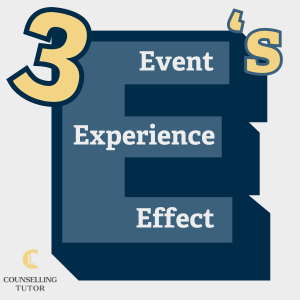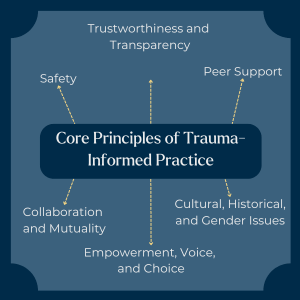Trauma Informed Practice Course
The Competence and Confidence to Work with Trauma in Your Practice.
The following article is taken from our Trauma-Informed Practice course.

The Competence and Confidence to Work with Trauma in Your Practice.
Trauma-informed practice (TIP) is an essential framework within counselling and psychotherapy. It focuses on understanding and responding to the impact of trauma on individuals. The aim is to create a therapeutic environment that promotes healing and avoids re-traumatisation. This article provides an overview of TIP, examining its key components and principles and offering insights into how you can integrate this approach into your practice.
What is Trauma-Informed Practice?
Ken Kelly: What is trauma-informed practice, Rory?
Rory Lees-Oakes: I think that’s a very interesting question, Ken, and I think that trauma-informed practice is a framework. First and foremost, it’s a framework and it’s been laid down by an organisation called SAMSA, which is an American organisation, it’s the National Association for Substance Abuse and Child Welfare in America.
When I trained many years ago in trauma-informed practice, they set out the principles of what it is. I notice, with interest, that the Office for Health Improvements and Disparities here in the UK, also has a working definition of trauma-informed practice, which, which is built on that SAMSA framework.
So every professional should know what the framework is. It focuses on understanding and responding to the impact of trauma. So knowledge is really important about what trauma is and how it might present. It also promotes healing from traumatic events or a series of traumatic events, but also, it understands that we need to avoid retraumatisation.
I think one of the danger areas in therapy, is that clients may become retraumatised and we must, at all costs, avoid retraumatising somebody. So that’s the headline. But if we look at the detail, it focuses on Three E’s: event, experience and effect. Looking at how we implement trauma-informed care, recognising key principles, and also the practical application of the skills that we use. So that is the short answer to the question you’ve asked, but what we do have to realise is there is a framework. And I think everybody should visit that framework, and make themselves aware of it, because it’s not just focused on the trauma, it’s a whole infrastructure, a whole philosophy of how we work with clients.
Ken Kelly: Yeah, I like it. I like how you’ve mentioned that it is a framework, and we’re speaking about a framework which kind of holds how we might identify trauma and how we might work with that within our practice.
It starts with understanding what trauma is. As you’ve outlined, Rory, trauma within this framework is defined as The Three E’s, and that is event, experience, and effect. So the event being an uncontrollable, something happens in somebody’s life, there is an event that plays out that is beyond their control.
From that event, there is an experience that the individual goes through, they have that traumatic experience, and then the effect. So we’ve got the event, we’ve got the experience of that traumatic experience. We’ve now got the effect.
The effect being that traumatic experience does not dissipate, it follows that person, stays with them at some level. Doesn’t mean that it dominates their every waking moment, and it can do just slightly after the effect, but even years later, there can be words, triggers, smells, situation, body temperature, just something that almost kind of keys back and reminds the person of the event and the experience. And it becomes a loop where the effect is that person is held hostage, and not able to live their best life free of this traumatic event. It’s just happening again and again, if I understood that correctly, Rory?
Rory Lees-Oakes: Yeah, absolutely, Ken. And I think that you’ve outlined very carefully what trauma can look like in terms of how it might present. And I think the other thing we have to really consider is the other side issues that come from traumatic experiences. So I’m thinking really of cultural, historical, and gender issues.
When I did my research 20 years ago into Post Traumatic Stress, the thinking was that this was big events. Things like, terrorist attacks or, toss or huge great events war where people ga were traumatised. But actually we know now that, while that is true, trauma can present in many different ways.
And one of the things that we do know is the trauma of dual burden. Where minorities, say someone who is black is attacked by a racist, shall we say. Then there’s a dual burden of trauma. The first trauma is the actual event of being attacked, but there’s a parallel event.
Of that person being attacked for who they are, in this case, someone who is black. And that is something we have to really consider as practitioners in the therapy room, the dual burden of it. Understand that there’s not only a traumatic event, but a cultural event that’s gone on here a negative cultural event.
And we have to be thoughtful of that. And I guess, that’s why it’s so important that when we work with trauma. A good grounding. Some form of training is absolutely essential because it’s nuanced. It’s got depth, and also it’s essential. One of the core principles of trauma-informed practice is safety, making sure. Clients feel safe with you, even though you’ve not done anything that has to be thought about and planned, looking at the intake form, how are you going to make sure that initial meeting the client feels safe?
Because it could be very difficult for traumatised clients to even meet on a online platform if they’re having online therapy or walk into the therapy room.
Ken Kelly: I love that you’ve underlined the need for training. It’s so important, going through your formal counselling training does not necessarily prepare you.
You’re laying the groundworks of how to be a counsellor, a practitioner, an empathic person using your modality to work with someone. But when it comes to trauma, there are other areas that we need to be aware of, and the importance of training cannot be.
I guess emphasise more how important it is. As we say, often there’s no secret that at Counselling Tutor, we are a training provider company. We have a trauma-informed practice training course for practitioners that might be interested. But back to The Four R’s. So we started off with The Three E’s, the event, the experience and the effect. When we’re talking about trauma-informed care, we are really talking about The Four R’s when we put it within this trauma-informed practice framework.
And that is realisation, and this is for us as the practitioner, this is what we would look at in training. And it’s that recognising the widespread impact of trauma, and understanding potential paths for recovery for our clients on who they are and how they might present. The recognition, identifying the signs, is a really important one because if it’s missed, somebody is showing signs of reliving a past trauma and we miss that, we’re not meeting the clients only where they are. So identifying the signs and symptoms of trauma in clients, families, staff, and others involved in the system, and including at some level, in ourselves as well.
And then there is the response, it’s integrating the knowledge about trauma into your policies and procedures. As you’ve already said, Rory, it’s gonna start from the very moment that you meet a client, you as a trauma-informed practitioner. It’s a holistic way of looking at how you work with clients, and it starts from your first contact, your intake form, your contract.
And then the resistance, actively working to prevent retraumatisation. You started with that as such an important point and that gives us our Four R’s. It’s the realisation, recognition, response, and resistance. These components provide a foundation to create that safe and supportive client environment, Rory?
Rory Lees-Oakes: Yeah, absolutely. And that environment is wrapped in safety and empowerment.
The times I’ve worked with traumatised clients before they can process the trauma, they have to feel safe. That lives in the therapeutic relationship in how you are and the communication you build between yourself and the client, and also the room to some extent.
Have a think about your room. I’m sure lots of people out there have lovely therapy rooms, but it is worth asking sometimes if a client’s got trauma, just ask them very gently, show them a picture of the room. I think that’s why it’s so important.
If you have a website, or a listing, have a picture of the room and say, do you wanna have a look at the room? Is that gonna be okay for you? And people might say yes, they might say, I’ve got a bit of a problem with something that’s in the room and you can remove it.
I’ve done that before now, mirror, was one that I had. Where someone said to me, oh, has it got mirrors? And I said, yeah, but I can either turn them round, or take them off, or cover them up, and the response was, if you could do that would be fine, and that’s what I did. And also empowerment, I think that part of working with trauma, is to work in the here and now.
And to help clients regain those lost parts of themselves to reintegrate those lost parts and become as whole a person as they can. Because a lot of trauma lives in the past, it lives either in the near past or for a lot of clients in the distant past when they were children.
Helping and empowering clients to come into the here and now, to realise their own personal power, is so important. There are times, where I may have said to a client, you are 42, you are not three or six anymore.
And that realisation that actually that’s right. I am an adult person. I have personal power. Is incredible because most trauma lives in the distant past.
Ken Kelly: Yeah. 100% So if we’re talking about the core principles of trauma-informed practice. Once we’ve recognised what trauma is, and we’ve looked at the trauma form care, those Four R’s, we then go onto the core principles that we’d bring into our practice. And you’ve mentioned all of them, Rory, but I’m gonna just recap and first one is safety.
Ensuring clients feel physically and psychologically safe. The therapeutic environment, like you said, Rory, simply asking how this feels for you is a really good start there. Trustworthy and transparency, super important, building that trust through clear communication, consistent boundaries.
Peer support, recognising the value of shared experience and providing opportunities for peer support, collaboration, working collaboratively with clients and other professionals to foster that healing process.
Empowerment, voice, and choice. Supporting clients to make informed decisions and encouraging them to take an active role in their journey. Because it is about them, and they need to be part of that. There’s not a magic sentence that we can say as a counsellor where a person that is experiencing a level of trauma is gonna go, oh, that’s fantastic, I feel much better now. And it may ease, and we may be able to use our techniques, but at the end of the day, it’s that person that needs to work through their emotions and their trauma themselves.
And then of course having that cultural, historic, and gender understanding. Recognising that is part of this. Do formal training, if you’re gonna be looking to work with trauma it’s really important.

The concept of trauma can be understood through the framework of the three E’s: Event, Experience, and Effect. This model, outlined by the Substance Abuse and Mental Health Services Administration (SAMHSA), provides a comprehensive understanding of how traumatic events are experienced and the lasting effects they can have on individuals.
A natural disaster or personal violence can be traumatic if the individual experiences intense fear, helplessness, or horror. The effects of such experiences can manifest in various psychological and physiological symptoms, including anxiety, depression, and post-traumatic stress disorder (PTSD).
Trauma-informed care is a framework for understanding and responding to the impact of trauma. SAMHSA outlines this framework through the four R’s:
Recognising the widespread impact of trauma and understanding potential paths for recovery.
Identifying the signs and symptoms of trauma in clients, families, staff, and others involved in the system.
Integrating knowledge about trauma into policies, procedures, and practices to support healing.
Actively working to prevent re-traumatisation.
These components provide a foundation for you to create safe and supportive client environments.
Six principles form the core of trauma-informed practice, ensuring that the needs and safety of clients are prioritised:
1. Safety: Ensuring clients feel physically and psychologically safe in the therapeutic environment.
2. Trustworthiness and Transparency: Building trust through clear communication and consistent boundaries.
3. Peer Support: Recognising the value of shared experiences and providing opportunities for peer support.
4. Collaboration and Mutuality: Working collaboratively with clients and other professionals to encourage healing.
5. Empowerment, Voice, and Choice: We support clients in making informed decisions and encourage them to take an active role in their recovery.
6. Cultural, Historical, and Gender Issues: Being sensitive to the cultural, historical, and gender contexts of trauma and addressing these factors in treatment.

For organisations, integrating trauma-informed principles involves training staff, revising policies, and creating an environment that prioritises safety and empowerment. Individual practitioners continuously engage in self-reflection and professional development to ensure their practice aligns with trauma-informed principles. This includes understanding the potential for vicarious trauma and maintaining a robust support system, such as supervision and peer networks.
What is Trauma-Informed Practice?
The integration of trauma-informed practices in counselling and psychotherapy is crucial for providing effective and compassionate care. By understanding the impact of trauma and implementing the principles of trauma-informed care, practitioners can create a supportive environment that promotes healing and resilience. This approach not only benefits clients but also enhances the well-being and effectiveness of practitioners themselves.
Substance Abuse and Mental Health Services Administration (SAMHSA). (2014). SAMHSA’s Concept of Trauma and Guidance for a Trauma-Informed Approach. National Center for Substance Abuse and Child Welfare. SAMHSA Trauma Guide
Notice any broken link or issues with this resource? Kindly let us know by email
Email us